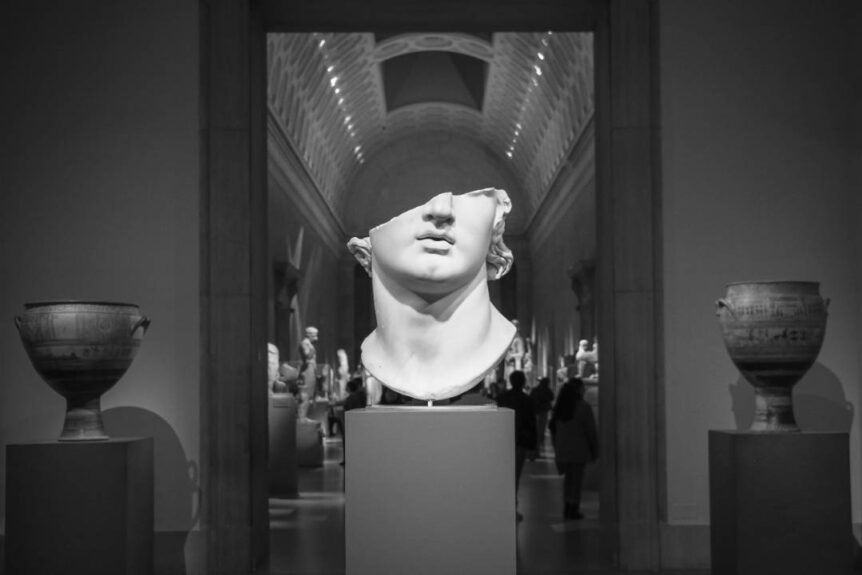Art Curation and Ethics: Navigating Controversy and Cultural Sensitivity
In art curation, ethical considerations play an important role in shaping exhibitions and projects that resonate with diverse audiences. Moreover, with the art world increasingly reflecting the complexities of a global society, the demand for a nuanced understanding of curatorial ethics has never been more pressing.
This article aims to provide curators, museum professionals, and cultural practitioners with a set of resources to navigate these challenges effectively.
Foundational Ethics and Standards
Foundational ethics and standards form the cornerstone of curatorial practice, ensuring that museums and cultural institutions operate with integrity, transparency, and accountability. These resources provide essential guidelines and frameworks that help curators navigate the complex ethical landscape of museum work, from acquisitions and fundraising to interactions with donors and the public. By adhering to these established standards, curators can uphold the trust placed in them by their communities and ensure the long-term sustainability of their institutions.
- ICOM Code of Ethics: New Standards for Fundraising and Accessioning: This document is a comprehensive guide that outlines the ethical responsibilities involved in museum operations, including crucial aspects like fundraising and handling acquisitions.
- A Guide to Curatorial Ethics by the American Alliance of Museums: A pivotal resource offering in-depth insights into the ethical considerations specific to curatorial work, helping professionals navigate the challenges they face in their daily practices.
- Exploring Ethical Dilemmas in Art Museums: This research article delves into contemporary ethical challenges faced by art museums, offering a scholarly perspective on navigating these issues.
Activism and Sponsorship in Art
The intersection of activism and sponsorship in art explores how art can serve as a medium for social change and the ethical considerations that come with accepting corporate sponsorship. This area delves into the responsibilities of curators to balance artistic freedom and integrity with the financial realities of running cultural institutions. These resources discuss the complexities of such relationships and offer perspectives on how curators can navigate these ethical dilemmas while maintaining their commitment to social and political relevance.
- Beyond Reflection: Radical Pedagogy and the Ethics of Art Sponsorship: An insightful exploration of the issue of corporate sponsorship in the arts, focusing on the ethical considerations that institutions must weigh.
- Curatorial Ethics and Outsider Art: A New Perspective: Discusses the unique ethical considerations when curating outsider art, highlighting the importance of respectful and sensitive presentation.
- What Is Curatorial Activism? by Artnews: This article sheds light on curatorial activism, a practice that emphasizes the curator’s role in addressing and challenging societal issues through thoughtful exhibition-making and programming.
Ethics in Curatorial Practice
Ethics in curatorial practice encompasses the day-to-day ethical considerations and decisions that curators face, from the representation of diverse voices to the handling of sensitive subjects. This area emphasizes the importance of ethical decision-making in creating inclusive, respectful, and engaging exhibitions that reflect a multitude of perspectives and narratives.
- Ethics of Engagement in Contemporary Art: Provides a comprehensive analysis of how contemporary art practices engage with ethical issues, offering insights into the curator’s role in facilitating this engagement.
- Curatorial Activism: Towards an Ethics of Curating: Discusses the concept of curatorial activism, urging curators to adopt an ethical approach that actively challenges injustices and amplifies marginalized voices through their exhibitions.
- Curatorial Ethics in Practice: Offers practical advice and examples of ethical challenges in curatorial work, emphasizing the importance of thoughtful, inclusive curation.
Navigating Controversy and Censorship in the Arts
Art often serves as a reflection of societal values and issues, sometimes leading to controversy or debates about censorship. This section focuses on the curator’s role in managing controversial content, balancing the freedom of expression with cultural sensitivity and community standards. The resources provided offer strategies and best practices for curators to handle contentious artworks and exhibitions, ensuring that museums remain spaces for open dialogue and critical engagement while respecting diverse perspectives.
- Smart Tactics: Curating Controversial Art: This compilation of resources offers practical strategies for curators facing the challenge of presenting controversial art, providing insights into navigating public reactions and media scrutiny.
- Art and Culture Censorship Timeline by the National Coalition Against Censorship: A valuable historical overview of censorship in art and culture, helping curators understand the context and implications of controversial artworks within a broader societal and historical framework.
By exploring these themes in depth, curators and cultural practitioners can gain a more nuanced understanding of the ethical dimensions of their work, fostering a more thoughtful, inclusive, and responsible approach to curatorial practice.
Summary
In this article, we’ve gathered a curated selection of resources designed to guide and support curators, museum professionals, and cultural practitioners in navigating the complex ethical landscape of curatorial work. From foundational ethics and standards to the intricacies of activism, sponsorship, and managing controversy, these resources offer valuable insights and practical advice.
Whether you’re dealing with the challenges of corporate sponsorship, aiming to practice curatorial activism, or striving to handle sensitive subjects with care, this compilation serves as a comprehensive toolkit. Our goal is to empower curators to make informed, ethical decisions that enhance the cultural and societal impact of their exhibitions and projects, fostering an environment of inclusivity, dialogue, and respect within the arts community.


